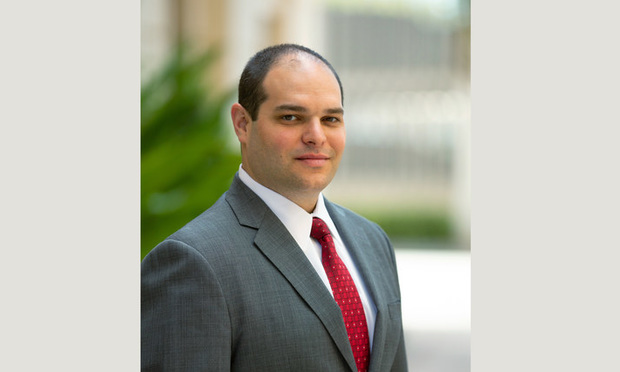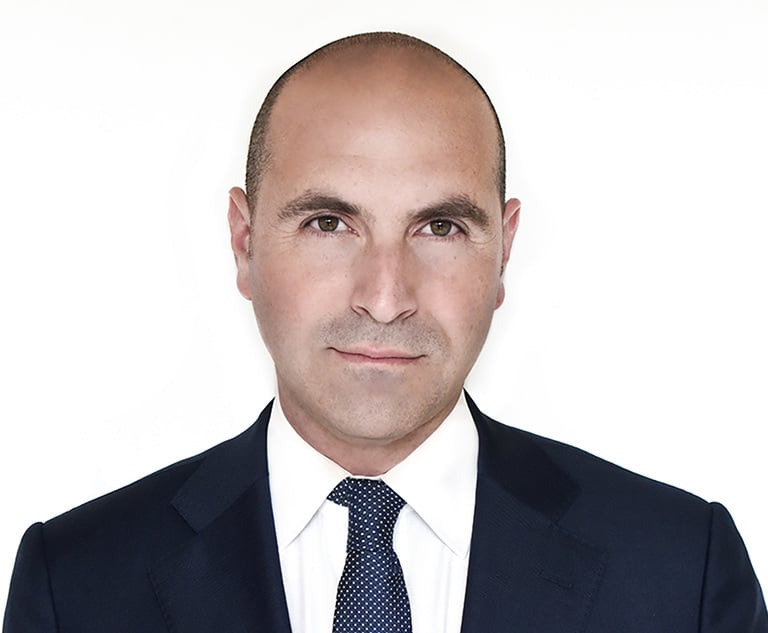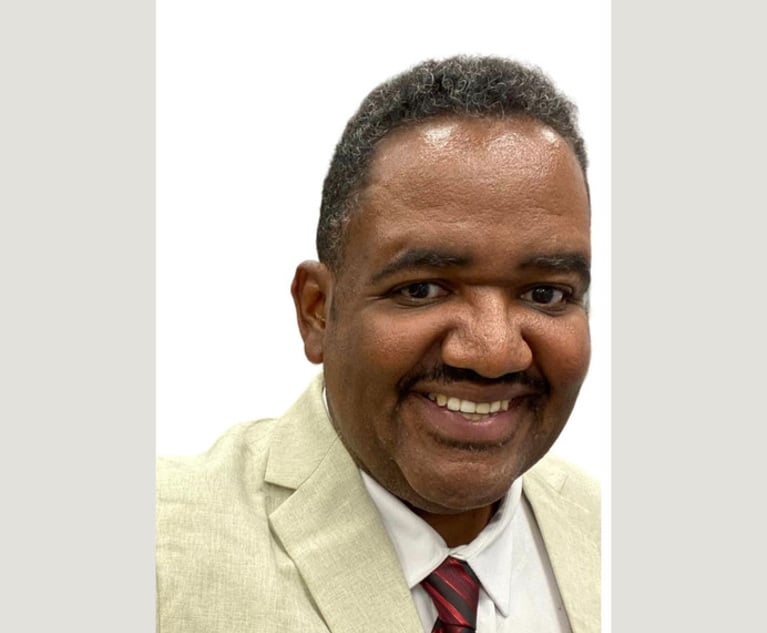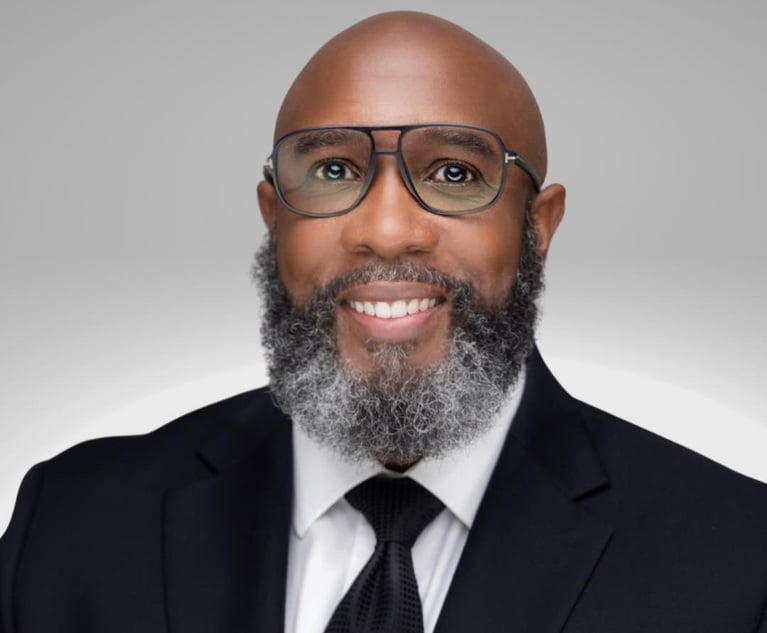Lawyering Behind Enemy Lines: Benjamin Widlanski's Time in a War Zone
"The Afghan people are some of the great survivors in the world," said Kozyak Tropin & Throckmorton partner Benjamin J. Widlanski, who served as a Judge Advocate General for the U.S. Army in his previous life.
March 01, 2019 at 02:52 PM
6 minute read
 Benjamin Widlanski of Kozyak, Tropin & Throckmorton in Miami. Courtesy photo.
Benjamin Widlanski of Kozyak, Tropin & Throckmorton in Miami. Courtesy photo.
Before plaintiffs lawyer Benjamin J. Widlanski was a partner at Kozyak, Tropin & Throckmorton or a federal prosecutor for the Southern District of Florida, he had a different mission.
As a captain in the U.S. Army's Judge Advocate General, or JAG, corps, Widlanski's work day wasn't exactly predictable.
“There's no one particular task. The needs of the Army take over,” he said. “You're a lawyer, yes, but you're also a soldier. So when your commander says, 'I want to do X,' you sort of have a responsibility to accomplish that goal.”
If a soldier or their family needed help writing a will, adopting a child, getting divorced or resolving a landlord-tenant dispute, or if commanders had questions about the law of armed conflict, Widlanski was their guy.
Widlanski was initially stationed in Hawaii, where he met his wife and served as a legal assistant, environmental lawyer, then trial counsel — military speak for prosecutor. As trial counsel, he advised commanders on discipline and legal action against soldiers charged with anything from bar fights and DUIs to sexual assault and espionage, then prosecuted cases through court-martial.
Three years in, Widlanski served in Afghanistan on the Rule of Law Task Force. The goal? To help the country develop a stable political body. He'd meet with the Afghan National Army, police, border patrol, prosecutors, government leaders and tribal elders in an effort to help them flourish in their roles.
According to Widlanski, it was unusual for a JAG to be stationed in an infantry unit — an on-foot combat team — rather than larger tactical units like brigades or divisions, but there he was.
“I was just sort of hanging out with all these war fighters, and I think for a while they didn't really know what to make of me,” Widlanski said.
Lawyering in Kunar Province
Widlanski wasn't in a big city like Kabul, which has a fairly robust police force and prosecutors. He was in Kunar Province — an area the U.S. Army calls “kinetic,” as a euphemism for violent.
One of Widlanski's tasks was to create a radio show centered around law and order, designed to demonstrate the benefits of Western-style leadership.
“I would write out a script and then my Afghan translators would essentially read it into the radio and it would be broadcast as a radio drama,” Widlanski said.
Storylines would vary, but featured crimes that were relevant to listeners. One character might steal another's goat, for example, or farm on land that wasn't theirs, and an imaginary government would respond.
Kunar Province consists of various tribes, according to Widlanski, and they typically looked to their elders or religious leader to respond to a crime.
“What we were trying to encourage them to do was to use the mechanisms of government,” Widlanski said. “Go to the police station. Go to the local provincial governor and say that this has happened.”
Widlanski even helped conduct a landmark trial.
“We don't know if they had criminal trials before the Russian invasion in the 1980s, but as far as we knew it was the first criminal trial in the history of Kunar Province,” Widlanski said. “We flew in a prosecutor, a defense attorney and a judge, and we built the courtroom for them.”
The defendant was found guilty of murder.
'The great survivors'
It's hard to tell how deeply the Army's message resonated, according to Widlanski, who pointed out that Afghanistan is no ordinary country, having essentially been thrown together by European powers throughout history.
“They drew a line on a map and said, 'This is Afghanistan.' So the people that live in Afghanistan have no national identity. They have a lot of different tribal and ethnic identities.”
But one powerful factor unifies them, in Widlanski's view.
“The Afghan people are some of the great survivors in the world,” Widlanski said. “They have been through stuff that Westerners can't really comprehend. They've had, essentially, a nonstop occupation and continuous war since the '80s. First it was the Russians, then it was the Taliban, then it was us. It's been war, after war, after war, yet they're still around and they're still surviving.”
For that reason, it's not easy to help when you're entering Afghanistan from the platform of yet another foreign invader.
“It's a very delicate balance,” Widlanski said. “You have to find people that are willing to work with you and, frankly, you don't always find that and it's hard.”
It was Widlanski's curiosity and love of “the big questions” that saw him study philosophy and religion before he gravitated to litigation — which is after all “philosophy made practical” in his view.
After serving for more than four years and collating various honors, including a Bronze Star Medal, Widlanski moved on to became assistant U.S. attorney for the Southern District of Florida.
He prosecuted former Miami firefighter Alexander Rousseau, imprisoned for possession of child pornography, and brought charges against Agustin Mendez-Vazquez and his son, locked up for running a modern-day slavery operation at a Homestead tomato farm.
Widlanski also volunteers with the Miami-Dade Veterans Treatment Court, mentoring vets who've been arrested.
“I'm not there as a lawyer,” he said. “I'm there as a friend.”
And he's still pondering the big questions, this time for plaintiffs at Kozyak Tropin & Throckmorton, which he joined in 2018 to represent fraud victims who've lost savings to Ponzi schemes.
“It was hard to leave the U.S. Attorney's Office because it's such a great office and the work they do is so amazing,” Widlanski said. “It's also hard to be a career government servant in Miami, and I wanted to make sure that I was taking care of my family as well.”
Above all, Widlanski's new job provides a happy medium for him to help those in need and to succeed financially.
“In a very real way it's similar to what I was doing at the U.S. Attorney's Office,” he said. “I'm trying to get justice for victims. It's put me in a place where I can both do well and do good.”
Benjamin J. Widlanski
Born: June 1982, New York
Education: Columbia Law School, J.D., 2007; Columbia University, B.A., 2004
Experience: Partner, Kozyak Tropin & Throckmorton, 2018-present; Assistant United States Attorney, United States Attorney's Office for the Southern District of Florida, 2013-2018; Captain, United States Army Judge Advocate General's Corps, 2008-2013; Associate, Boies Schiller Flexner, 2007-2008
More attorney profiles:
There's No Business Like Show Biz Law: James Sammataro Pulls Back the Curtain
Art, Cars, Parrots and Other Spoils of Miami Fraud Lawyer Edward H. Davis
'Star Trek' and Separations: Attorney Cynthia Greene's Bold Journey Into Family Law
This content has been archived. It is available through our partners, LexisNexis® and Bloomberg Law.
To view this content, please continue to their sites.
Not a Lexis Subscriber?
Subscribe Now
Not a Bloomberg Law Subscriber?
Subscribe Now
NOT FOR REPRINT
© 2025 ALM Global, LLC, All Rights Reserved. Request academic re-use from www.copyright.com. All other uses, submit a request to [email protected]. For more information visit Asset & Logo Licensing.
You Might Like
View All
Growing Referral Network, Alternative Fees Have This Ex-Big Law’s Atty’s Bankruptcy Practice Soaring
5 minute read
Against the Odds: Voters Elect Woody Clermont to the Broward Judicial Bench
4 minute read
Miami Civil Judge Myriam Lehr to Say Goodbye to the County Court Bench
4 minute readTrending Stories
- 1The New Rules of AI: Part 2—Designing and Implementing Governance Programs
- 2Plaintiffs Attorneys Awarded $113K on $1 Judgment in Noise Ordinance Dispute
- 3As Litigation Finance Industry Matures, Links With Insurance Tighten
- 4The Gold Standard: Remembering Judge Jeffrey Alker Meyer
- 5NJ Supreme Court Clarifies Affidavit of Merit Requirement for Doctor With Dual Specialties
Who Got The Work
J. Brugh Lower of Gibbons has entered an appearance for industrial equipment supplier Devco Corporation in a pending trademark infringement lawsuit. The suit, accusing the defendant of selling knock-off Graco products, was filed Dec. 18 in New Jersey District Court by Rivkin Radler on behalf of Graco Inc. and Graco Minnesota. The case, assigned to U.S. District Judge Zahid N. Quraishi, is 3:24-cv-11294, Graco Inc. et al v. Devco Corporation.
Who Got The Work
Rebecca Maller-Stein and Kent A. Yalowitz of Arnold & Porter Kaye Scholer have entered their appearances for Hanaco Venture Capital and its executives, Lior Prosor and David Frankel, in a pending securities lawsuit. The action, filed on Dec. 24 in New York Southern District Court by Zell, Aron & Co. on behalf of Goldeneye Advisors, accuses the defendants of negligently and fraudulently managing the plaintiff's $1 million investment. The case, assigned to U.S. District Judge Vernon S. Broderick, is 1:24-cv-09918, Goldeneye Advisors, LLC v. Hanaco Venture Capital, Ltd. et al.
Who Got The Work
Attorneys from A&O Shearman has stepped in as defense counsel for Toronto-Dominion Bank and other defendants in a pending securities class action. The suit, filed Dec. 11 in New York Southern District Court by Bleichmar Fonti & Auld, accuses the defendants of concealing the bank's 'pervasive' deficiencies in regards to its compliance with the Bank Secrecy Act and the quality of its anti-money laundering controls. The case, assigned to U.S. District Judge Arun Subramanian, is 1:24-cv-09445, Gonzalez v. The Toronto-Dominion Bank et al.
Who Got The Work
Crown Castle International, a Pennsylvania company providing shared communications infrastructure, has turned to Luke D. Wolf of Gordon Rees Scully Mansukhani to fend off a pending breach-of-contract lawsuit. The court action, filed Nov. 25 in Michigan Eastern District Court by Hooper Hathaway PC on behalf of The Town Residences LLC, accuses Crown Castle of failing to transfer approximately $30,000 in utility payments from T-Mobile in breach of a roof-top lease and assignment agreement. The case, assigned to U.S. District Judge Susan K. Declercq, is 2:24-cv-13131, The Town Residences LLC v. T-Mobile US, Inc. et al.
Who Got The Work
Wilfred P. Coronato and Daniel M. Schwartz of McCarter & English have stepped in as defense counsel to Electrolux Home Products Inc. in a pending product liability lawsuit. The court action, filed Nov. 26 in New York Eastern District Court by Poulos Lopiccolo PC and Nagel Rice LLP on behalf of David Stern, alleges that the defendant's refrigerators’ drawers and shelving repeatedly break and fall apart within months after purchase. The case, assigned to U.S. District Judge Joan M. Azrack, is 2:24-cv-08204, Stern v. Electrolux Home Products, Inc.
Featured Firms
Law Offices of Gary Martin Hays & Associates, P.C.
(470) 294-1674
Law Offices of Mark E. Salomone
(857) 444-6468
Smith & Hassler
(713) 739-1250







